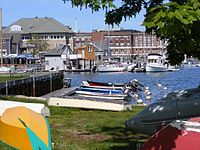Woods Hole Marine Biological Laboratory
 |
|
 |
|
| Established | 1888 |
|---|---|
| Research type | Pure and applied research |
|
Field of research
|
biology, ecology, climate change, novel model organisms, embryology and evo-devo, physiology, neuroscience, sensory systems, microbiology, microbial ecology, genomics, aquaculture, tissue engineering, regeneration, marine biology, biodiversity informatics |
| Dean | interim directors Melina Hale, Neil Shubin |
| Address | 7 MBL Street |
| Location |
Woods Hole, Massachusetts, United States 41°31′34.40″N 70°40′22.40″W / 41.5262222°N 70.6728889°WCoordinates: 41°31′34.40″N 70°40′22.40″W / 41.5262222°N 70.6728889°W |
| 02543-1015 | |
| Nickname | MBL |
| Affiliations | University of Chicago |
| Website | www |
The Marine Biological Laboratory (MBL) is an international center for research and education in biological and environmental science. Founded in Woods Hole, Massachusetts, in 1888, the MBL is a private, nonprofit institution affiliated with the University of Chicago. After being independent for most of its history, it became affiliated with the university on July 1, 2013. It also collaborates with numerous other institutions.
The MBL has approximately 250 year-round employees, about half of which are scientists and scientific support staff. They are joined each year by more than 300 visiting scientists, summer staff, and research associates from hundreds of institutions around the world, who conduct research in the Whitman Center for Visiting Research (MBL Facts).
During the summer, more than 1,400 students and faculty from around the world come to the MBL to participate in the laboratory's graduate-level courses, including Neurobiology, Microbial Diversity, Frontiers in Reproduction, and Biology of Parasitism. Some of these courses (Physiology, Embryology, and Neural Systems and Behavior, formerly called Invertebrate Zoology) have been offered for more than a century (MBL Facts).
The MBL's three main resident research centers are The Ecosystems Center, The Bay Paul Center for Comparative Molecular Biology and Evolution, and the Eugene Bell Center for Regenerative Biology and Tissue Engineering (MBL Facts).
MBL programs train postgraduates, undergraduates, science teachers, historians, and science journalists. Throughout the year, the MBL is the site for research and planning conferences organized by professional scientific groups (MBL Facts).
The MBL shares a library, the MBLWHOI Library, with Woods Hole Oceanographic Institution. The MBLWHOI Library holds print and electronic collections in the biological, biomedical, ecological, and oceanographic sciences, and houses a growing archival collection, including photograph and videos from the MBL's 120-year history. The library also conducts digitization and informatics projects (MBL Facts).
In May 2017, Neil Shubin, Ph.D., and Melina Hale, Ph.D., were named interim co-directors of the Marine Biological Laboratory, succeeding Huntington F. Willard.
The Marine Biological Laboratory grew from the vision of several Bostonians and Spencer Fullerton Baird, the country's first Fish Commissioner. Baird had set up a United States Fish Commission research station in Woods Hole in 1882, and had ambitions to expand it into a major laboratory. He invited Alpheus Hyatt to move his marine biology laboratory and school which he had founded at the Norwood-Hyatt House in Annisquam, Massachusetts, to Woods Hole. Inspired by Harvard biologist Louis Agassiz's short-lived summer school of natural history on Penikese Island, off the coast of Woods Hole, Hyatt accepted the offer. With $10,000 raised by the Woman's Education Association of Boston and the Boston Society of Natural History, land was purchased, a building was erected, and the MBL was incorporated with Hyatt as the first president of the board of trustees. The Fish Commission supplied crucial support, including marine organisms and running sea water (Maienschein, 1989).
...
Wikipedia
